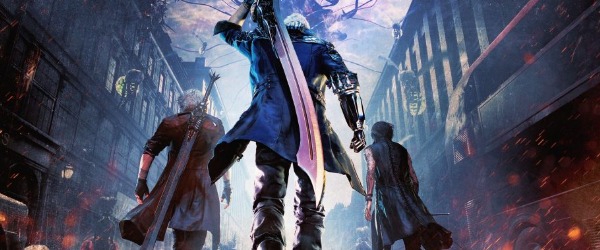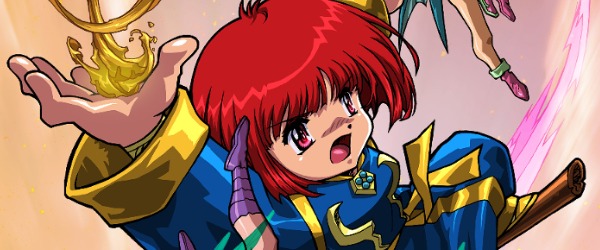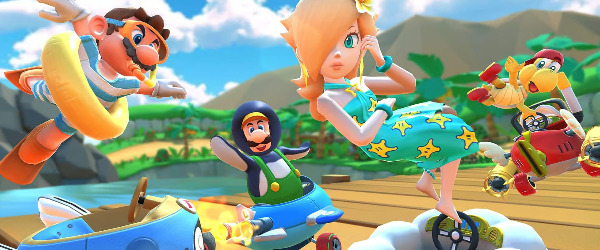
History of Final Fantasy: Paradigm Shift (Final Fantasy XIII) - Article
by Taneli Palola , posted on 07 March 2017 / 13,190 ViewsDespite critical acclaim, great sales, and in general being a very good game in my personal opinion, Final Fantasy XII turned out to be one of the most divisive entries in the long-running series. Some players absolutely adored the new elements it introduced and the changes it made to the traditional formula, but others felt that it was those very same additions and changes that made the game almost unbearable. In addition to that, Final Fantasy XII was released at the tail-end of a console generation, meaning that the next mainline entry in the series would also debut on a new generation of consoles.
This was the environment into which Final Fantasy XIII was developed and subsequently released. It not only had to usher in a new era for the series as the vanguard for a new console generation, but also draw back many fans who had been bitterly disappointed by its immediate predecessor, and that's all without mentioning Square Enix's big marketing tool - its shiny new game engine, Crystal Tools. As such, Final Fantasy XII certainly had a lot to live up to. The results were mixed to say the least.
Walking a Very Narrow Path: Final Fantasy XIII
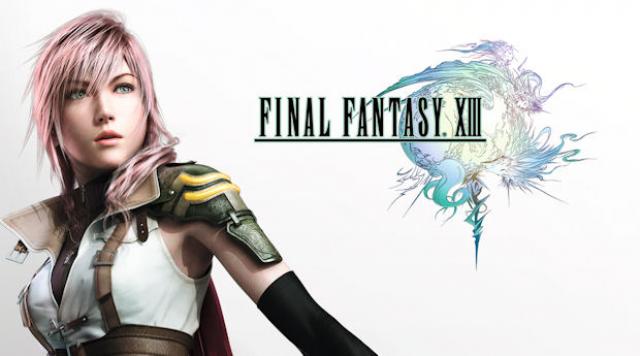
Initial development of Final Fantasy XIII began in 2004, when the basic plot concepts were created by Kazuchike Nojima and Motomu Toriyama. Much of the game's development team consisted of those who had worked on Final Fantasy X and X-2, including Yoshinori Kitase as producer, Toriyama as director, and Tetsuya Nomura as the main character designer.
Other familiar names involved in the game's development included the likes of Daisuke Watanable (lead scenario writer), Yoshitaka Amano (logo design and conceptual illustration), and Masashi Hamauzu, who for the first time was sole composer for a game in the mainline Final Fantasy series.
Originally, Final Fantasy XIII was intended to be released on the PS2, but with Sony's next console being announced and Square's 2005 PS3 tech demo, which showed the opening to FF VII, garnering a very positive reaction from fans they decided to move the game to the PS3 and to the new Crystal Tools game engine. Another reason for the change of platforms was the unexpectedly long development time for Final Fantasy XII, which was still yet to be released at the time.
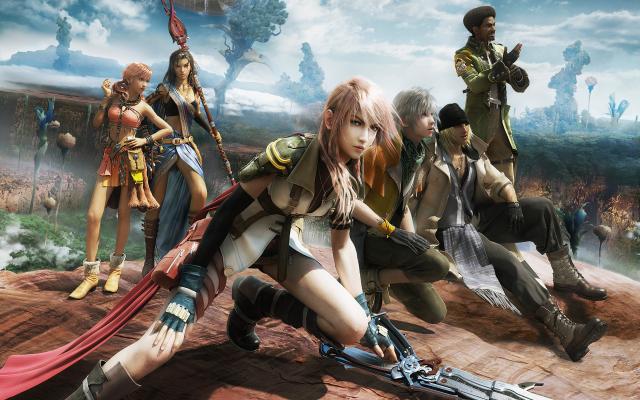
However, developing for Sony's new console proved to be more difficult than anticipated. The console's architecture, the new game engine, and the largest development team in the series' history all contributed to other problems that arose during development. One of the many issues cited by the developer for the tortured development process was the lack of a clear, unified vision for what the game should be. Even very late into its development the team didn't agree on many of the title's key elements.
There were also various issues during the localization process. The English translation was being done alongside the Japanese version, but the script and many of the game's cut scenes kept getting changed even after the English script had been finalised. Because of this the entire English voice-over ended up being re-recorded at least four times over the course of the game's development.
All this, together with a very tight schedule, experimenting with western methods of game development, and trying to accommodate player feedback from around the world resulted in a game with a troubled creation process - something that was unfortunately quite clearly apparent in the final product.
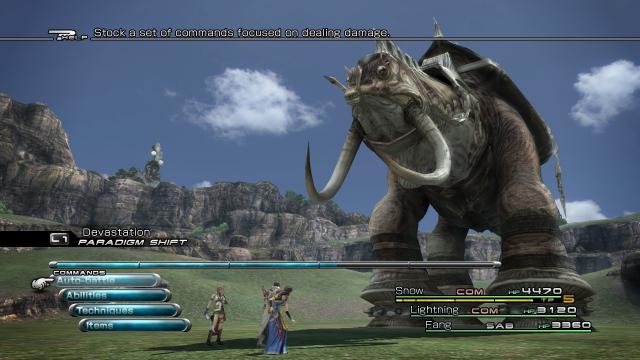
In terms of gameplay, Final Fantasy XIII is a mix of old and new. As usual, the player controls the party leader on the field map, while the other characters move independently around the leader. One of the new elements the game added was a sort of incidental dialogue where the characters would talk with each other as they traversed the world, discussing various events, points of interest, or other random things.
As was already the case in Final Fantasy XII, monsters in FF XIII are always visible on the field, allowing players to avoid them if they so decide. The actual combat takes place in a separate battle screen, unlike in FF XII. In battle the player only controls the party leader, while the rest of the group is AI controlled. The battle system is a variation on the series' classic ATB system and is called the Command Synergy Battle system.
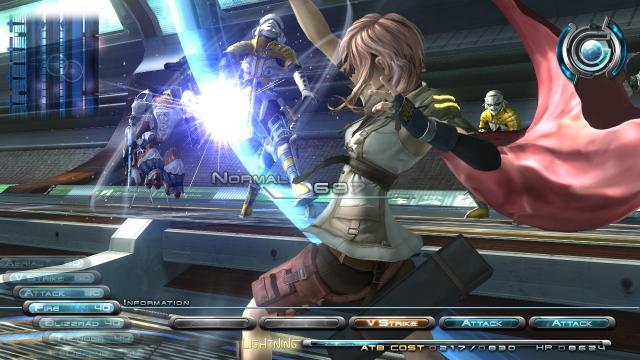
The CSB system features an ATB gauge divided into sections. Each command the player issues in battle takes a certain number of sections, of which up to six can be gained throughout the game. The player can then chain several commands in one turn. If only part of the gauge is used during a turn, the next one will come up faster as a result.
The most significant new element Final Fantasy XIII introduced to battles was the chain gauge, which each enemy in the game has. The gauge fills every time the player attacks the enemy, and once it's filled the enemy becomes staggered, allowing you to deal massively increased damage or even launch it into the air. Staggering is practically a necessity in order to win many of the title's battles.
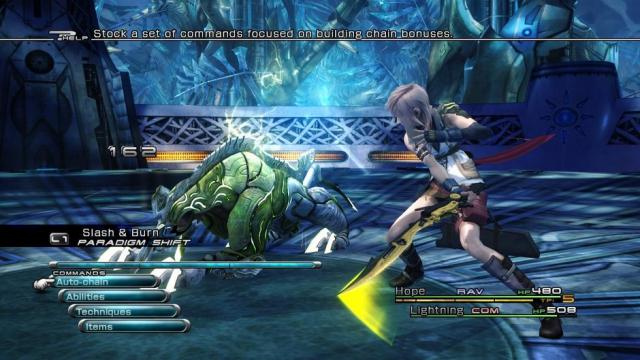
Final Fantasy XIII also features a class system. As the player can only control the party leader in battle, the other characters' actions are controlled through a system called the Paradigm Shift. Essentially, each Paradigm is a preset stance that, once switched, changes the classes of each active party member. The player can change between the different Paradigms at will as necessary, but individual character classes can't be changed during combat.
In total there are six different classes in the game, each with their distinct abilities and fighting styles. Commando is the main physical damage dealer, while Sentinels focus on tanking damage and drawing attention to themselves. Medic heals the party, and Saboteur and Synergist weaken opponents and buff party members, respectively. Finally, Ravager is the class best suited for building the chain gauge in order to stagger enemies.

Summons naturally take their rightful place in the combat system once again. This time each character has a specific summon which is unlocked at various pivotal points during the plot. Once summoned, they replace the other two party members in combat, and stay until they are defeated or enough time passes.
Character development is somewhat similar to the Sphere Grid in Final Fantasy X, where each character earns points they can spend to purchase new abilities and stat boosts. This goes by the name of Crystarium. While some of the abilities vary depending on the character, most of them are largely the same for everyone. The Crystarium also opens up in stages, preventing your characters from leveling up beyond a certain point until the next stage of the Crystarium is unlocked when the plot dictates it.
The game also has a simple equipment upgrade system, where you can use materials you get from defeated enemies to improve your weapons. This can be done at shop stations throughout, which brings me to another aspect of Final Fantasy XIII that was a massive departure from previous entries in the series. Final Fantasy XIII has virtually no towns to visit, breaking the usual JRPG formula of town-dungeon-town. The few towns and cities you do come across are generally closed-off locations where you won't be able to find any shops or other places to visit.
Additionally, there are also a number of side quests, which are mostly found in the latter half of the game. By and large these take the form of hunts, which the player can undertake to try and defeat many of the most powerful enemies in the game.
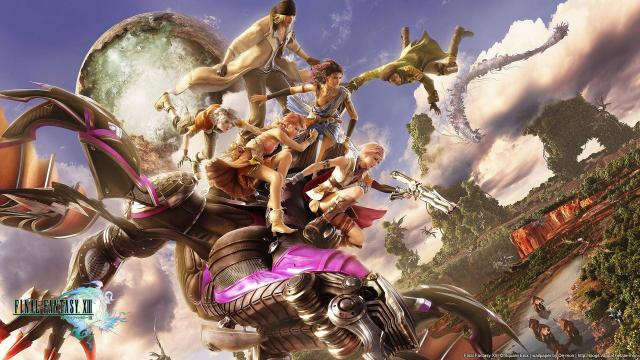
Final Fantasy XIII is set on Cocoon, an artificial world created by a God thirteen centuries ago, and Gran Pulse, the vast planet Cocoon orbits. Both are ruled by beings known as the fal'cie, powerful creatures that control various different aspects of the world they lord over. The Cocoon fal'cie control every aspect of life there, while Gran Pulse fal'cie mostly focus on cultivating the land itself, leaving humans to fend for themselves.
The game's story begins on Cocoon when a Pulse fal'cie is discovered in the town of Bodhum. Fearing that everyone who has been in its vicinity has become the fal'cie's servants, which are called the l'cie, Cocoon's leaders enact a purge and all of those caught up in it are to be sent down to Pulse. A girl named Serah Farron is thrust into the center of these events after accidentally being made an l'cie and taken captive by the fal'cie.

Serah's sister, Lightning, sets out to save her amidst the purge, and in doing so comes across several other people who, due to various circumstances, end up coming along. As they face the fal'cie Anima, Serah is turned into crystal and the group is made l'cie and shown a vision of Cocoon's destruction at the hands of a mythical beast called Ragnarok. They then realize that they have now been made enemies of Cocoon, as their mission as l'cie is to bring about the downfall of their homeworld. This sets in motion a series of events that forces Lightning and the rest of the group to become fugitives and escape from Cocoon's armies.
The game features six playable characters: Lightning, Serah's sister and a member of the Guardian Corps before the purge; Snow, Serah's fiancee; Hope, a young boy whose mother is killed during a conflict between the army and a resistance group called NORA which is led by Snow; Sazh, an airship pilot seeking to save his son from the purge; Vanille, a young girl whose past remains a mystery for much of the game; and Fang, a warrior woman with goals of her own that are separate from the rest of the group.
Final Fantasy XIII's soundtrack features a mix of different styles, from orchestral music to more modern sounds. While the score was composed in its entirety by Hamauzu, for the game's international release Square decided to change the main theme, removing the original Japanese song and replacing it with a song called “My Hands” by Leona Lewis, which is incidentally by far the weakest song on the entire soundtrack.
Final Fantasy XIII was released on December 17th, 2009, in Japan, and the following March in the rest of the world. It was an immediate commercial success, and ultimately went on to sell over 8 million copies worldwide. However, its critical reception was notably more mixed than that of past entries. While some aspects of the game were praised, many critics found the overall experience disappointing, and today it is often considered to be one of the series' weakest entries.
The Best Part
The music. Masashi Hamauzu created an excellent soundtrack for his first outing as lead composer, one that could quite possibly be his very best work to-date. Often the music that plays in a specific location does more to convey the tone and atmosphere of a scene than anything done by the characters or even the story. The variety of musical styles all fit perfectly into the game's world, and each new location has a unique feel to it - often as a direct result of the soundtrack.
The Worst Part
The poorly told story and character development. The saddest thing about Final Fantasy XIII is that the game world actually has a very interesting history and lore build around it. From the cultural differences between Cocoon and Gran Pulse to the history and religion surrounding the fal'cie, there's a lot of genuinely well thought out world-building to be found. It's a shame that it's all conveyed exceptionally poorly through a series a text logs which you slowly unlock piece by piece as the story progresses.
Instead of telling these things organically through dialogue and the world around the characters, almost all of the fascinating aspects of the game's world and its history are locked away in optional walls of text. If you decide to skip on reading most of these text logs then you'll basically miss half of the game's story. At the same time most of the dialogue spoken by the main characters while you run along the next thinly veiled corridor towards the next cut scene is pointless banter and contains nothing of consequence. I can't understand why they didn't use these moments of incidental dialogue as a way to build the world and characters instead.
Does Final Fantasy XIII Still Hold Up?
No. There are simply too many utterly baffling design choices and general shortcomings, such that the few things which the game does do well just end up not mattering in the long run. Every element that could have had potential to be genuinely great is undermined by some convoluted, non-sensical decision by the developer. There were often moments when I honestly found myself enjoying Final Fantasy XIII quite a lot, immersing myself in the world, the gameplay, and even the characters at times, but every time that happened something would come along to ruin the experience.
But, let's talk about the genuinely good stuff first. Visually, Final Fantasy XIII is an absolutely gorgeous game. Even today, over seven years since its release, the level of detail and polish put into each and every character and environment is astonishing. Even the menus contain so many small details and animated transitions that one can't help but be impressed by the amount of work put into making every single aspect of the game look as beautiful as possible. There were several moments where I found myself just looking at the scenery while listening to the excellent soundtrack.
As already mentioned, the music by Masashi Hamauzu is one of the genuine highlights of the game, and while I wouldn't call it quite among the series' best soundtracks, it is definitely a great score with numerous memorable songs. The one weak part is the Leona Lewis vocal theme that replaced the Japanese original. According to Yoshinori Kitase this was done because they found it difficult to translate the original song into English, but this feels like a weak excuse since FF X already featured a Japanese language theme song in all of its versions. They could have just left it as it was, instead of using a song that has no connection to the game's story or characters.
The battle system has both positive and negative aspects. Especially later in the game, when you get access to all of its features, the various classes and their combinations through the Paradigm shifts allows for a lot of tactical variety. Unfortunately most of the battles are easily won by simply using auto-battle over and over again. Only in the most difficult battles do you ever really need to actually consider your options and plan your moves. Basically, the majority of battles require very little input from the player, which makes them quite boring in the long run.
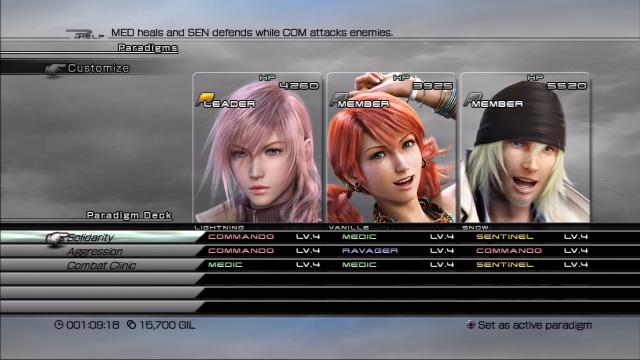
When the more tactical aspects of the system come into play it can be a very enjoyable system to work with, but even then it can very quickly become a source of frustration. For example, the difficulty curve has some rather unforgiving spikes at various points in the game, especially during your first playthrough when you don't know what to expect or what arbitrary combination of classes works in a particular instance.
Even worse is the developer's decision to trigger a game over screen whenever the party leader dies, regardless of whether or not the other members of the party are still alive. This can often lead to annoying situations where the party leader gets oneshot by an enemy while every other character is still at full health, but you'll still get a game over screen. If anyone else dies you can just revive them, but for some reason this doesn't apply to the character you control.
As already mentioned, the story is very poorly told with a slew of text logs instead of through organic interaction with the various characters and the game's world. There are moments of good storytelling to be had here and there, but too much of the game's lore and plot is confined to unwieldy menus. I genuinely like many of the themes Final Fantasy XIII explores, such as the main character's desire to escape an unjust fate that has been thrust upon them by uncaring, godlike beings, but this title ultimately fails to properly tell its story in an enjoyable way.
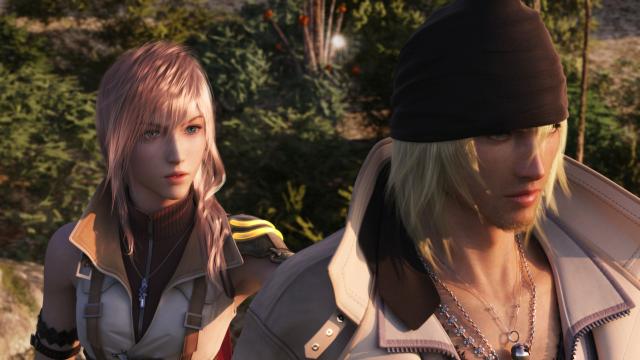
The characters are in a similar position, where many of them actually have interesting backstories or motivations for their actions, but the way they act throughout most of the game ends up making many of them entirely unlikeable and unrelatable. Some of their actions don't even make sense in the context of individual scenes, especially when it comes to Vanille. There's also a slight disconnect between the story and gameplay at times. Early on Hope is characterized as a weak, timid person who is way over his head in the midst of the constant fighting, and yet he joins the rest of the characters in battle without any issues.
Among the more prominent criticisms of Final Fantasy XIII were its general linearity and the lack of towns to visit. While it's true that the game does open up later on - and as a result some people have said it gets better at that point - getting better 25 hours in isn't really a point in the game's favour. That said, the lack of towns and shops to visit has never actually bothered me, since this actually works within the context of the story and fits the theme of the game.

The characters are essentially fugitives being chased by every possible armed force to be found in Cocoon, and normal people have been told to stay as far away from them as possible, so avoiding towns and heavily populated areas makes sense given the situation they're in. The linearity does tend to compound the problem though, as the lack of towns ends up making much of the game feel even more like a straight line from point A to B.
In the end, Final Fantasy XIII comes off as a game that lacked a strong vision to guide its development. The development team tried to please everyone by listening to fan feedback and ended up making a product that doesn't have an identity of its own. Individual parts of the game can be very enjoyable at times, but they don't come together nearly as well as they should, and every good aspect of it is buried under a mountain of shortcomings.

It genuinely feels like a game created by a bunch of individual small teams each working on one aspect of the title without any idea what the others were doing. The story and gameplay can feel completely detached from one another, the lore is well written and surprisingly detailed but told poorly, and the gameplay has moments of brilliance but numerous odd design decisions constantly undermine this.
Even with all of its flaws and strange elements I still don't consider Final Fantasy XIII a bad game, it's just not good enough for me to want to recommend it. It's worth maybe a single playthrough, but it doesn't hold up to any scrutiny and is easily amongst the weaker Final Fantasy games, especially as far as the main series is concerned. So of course they made two sequels for it... but more on those next time.
If you do decide to play Final Fantasy XIII it's quite easy to get your hands on and is currently available for the PS3, Xbox 360, and PC. By this point it's quite cheap as well.
Fun Fact
This was the first game in the main Final Fantasy series that did not feature the original “Prelude” or “Victory Fanfare” songs in any form. This was done, perhaps, with the intention of distancing and distinguishing it from previous titles as much as possible.
More Articles
the fall of square
Not anywhere near as good as 12 was and a game that took way too long to become interesting.
This game had it's okay moments, I mean while many didn't like them, I liked Vanille and Fang as characters, most of the character were whiny teenagers (they were too) but they had Aussie accents so...The idea of shifting 'paradigms' was clever and gave a unique feel to the combat but after that, this game really felt lacking compared to every other FF series entry. The simplified press X combat to make up for the speed of combat didn't work for me. I mean you had upgraded versions of magics (Fire, Fira and Firaga), yet it was better and easier just to do Fire all the time and it was situational, there didn't feel like there was any strategy behind it, especially as 'Press X to auto' did it for you. Then there was the levelling. Each character was 'stuck' to 3 types of abilities, leveling up the other ones were too expensive early on and while leveling up, you were stuck of set linear paths, again it was Press X to level. You already mentioned the story/narrative issues, some side characters were in one scene gone the next too, that was odd, we'd just met Cid and then we were fighting him, I felt no personal attachment to his side of things. The graphics were superb mind you.
I'm one of those that loved FFXIII despite the flaws within it. It certainly has some issues that shouldn't be present - makes no sense why it is instant game-over if the party leader falls (when other characters can revive!), the over-reliance of lineal dungeon design for the most part (which makes certain dungeons extremely boring in nature, like the L'Cie training ground below Cocoon), and the lack of any NPC interaction save for very brief sequences (in one of these you can even trigger a subsequent NPC interaction by defeating some enemies that stand in the way of two characters, so it makes you wonder how come NPCs took such a step-back in general). My biggest issue is probably Nautilus; it could have provided a much welcome, enjoyable full-minigames town, yet it's neglected to a "find Sazh chocobo" sequence then back to the same thing.
This being said, it is a great game. The combat system is simple in nature, but extremely fun to work around trying to maintain the Stagger bar while experimenting buffs/debuffs or Ravager combinations. I often find myself trying to kill everything in sight for the pleasure of watching that Paradigm combination work so well. To blame "unforgiving spikes" in the system and saying the player don't know what arbitrary combination to expect is kind of unfair to FFXIII when this is a trope every Final Fantasy invokes often; there's plenty of combat segments or sequences in general in all Final Fantasy games in which a first-timer has no correct way to guess what's the proper course of action, thus adaptability is called upon. And honestly, I would agree that Final Fantasy XIII is easier than most Final Fantasy games, but then again most Final Fantasy games, as I recall them, allows you to brute force your way just mashing the same command over and over for the most part when it comes to the weaker enemies that fill in between, or grinding. Auto-battle or Abilities through most enemies in FFXIII follows this same principle.
I disagree about the story as well; the plot only has one specific issue, and that's trying to be more what it is, which more often than not makes it try to go for complicated storytelling to tell even the simplest things. But at no point the game's codex is becomes mandatory: the story can be fully understood by paying attention to the game itself - the datalogs merely expand upon the lore that's already present within it. Sure, it eases the way sometimes, but once you get the hang of the terminology, there's not much the datalog will provide that the game itself doesn't, at least when it comes to its main plot.
I remember playing through it the first time and falling in love with the game. Got me extremely hooked and even went for the 100% back in its day. I've recently beaten it a second time (not 100% this time) and thus far, save for certain things, my opinion of it remains unchanged. It's a fantastic and enjoyable game. It sure has flaws, but there's plenty to love here if you can get past them.
It was kind of aggravating indeed. I think it was exhasperating knowing other characters could revive or cast Renew yet the game chooses to say it's Game Over regardless. It's a flaw that shouldn't be present.
But well, a quick Paradigm Shift to Snow in Sentinel and he'll cast all attention to himself. :P
The most 'mixed-bagged' Final Fantasy I have played. And while it still is a 'good' game amongst any game out there, it still was disappointing as a FF to me.
Keep on bringing those articles!
It had so much potential.
The best part about XIII is we know, no matter how concerned we are with a numbered FF title, it is not possible to be worse than XIII. So thank you S-E.
You are right I can't replay this game again it just don't have it in it, there is no value, unlike the best entries in the series, I almost agree on your points one by one, but I think some characters are really good, It's just the English voices where bad and do not fit, they are way better in Japanese voices, Cajole, Hope, Snow & even Lighting all suffer from bad acting or at least an actor / actress that don't understand his / her character
ah, final hallway 13. decent video game, terrible final fantasy game.
Loved final fantasy 13, I completely understood the story and the lore. I thought it was a brilliant and original idea. I actually had a better time and enjoyed the characters and have Better memories of FF13 and FF13-2 than I have FF15.
12 is much better atleast you could play it. where in 13 u just press X








